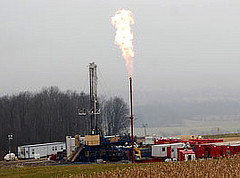Webinars on March 15 and 22 to examine Pa.’s new gas-well impact fee
live.psu.edu/story/58352#nw69

The webinars are aimed at two different audiences. The March 15 session is a broad overview for the public; the March 22 session is intended for local municipal officials.
UNIVERSITY PARK, Pa. — Two Web-based, evening seminars presented by Penn State Extension, on March 15 and 22, will provide a detailed examination of the shale-gas impact fee legislation recently passed by the General Assembly and signed into law by the governor.
The free webinars, both beginning at 7 p.m. and running 90 minutes, are aimed at two different audiences. The March 15 session, “What the Public Needs to Know about the New Shale Gas Impact Fee: Act 13,” will offer a broad overview, while the March 22 session targets local municipal officials in areas where Marcellus gas-well drilling is prevalent. The March 22 webinar will focus on the local control and planning aspects of the act.
Presenting in the March 15 webinar will be Timothy Kelsey, professor of agricultural economics in the College of Agricultural Sciences, and Stanford Lembeck, professor emeritus of agricultural economics and rural sociology and director of the Pennsylvania Municipal Planning Education Institute. They will briefly discuss background about “The Unconventional Gas Well Impact Fee Act,” including the scale of gas development so far in Pennsylvania, and the impacts on local governments and communities.
“We also will cover how Pennsylvania’s primary local taxes — the real property tax and the earned income tax — miss much of the economic growth occurring from Marcellus,” Kelsey said.
“We then will talk about the impact fee components of the act, including the fee schedule, the decision facing counties — and municipalities, if the counties don’t act — how the dollars will be allocated, and how local governments can use them.”
Kelsey noted that an introduction to the environmental setbacks and local-control components of the act will be provided in the March 15 webinar, including how the act relates to the Municipalities Planning Code.
“We will address what this means for local decision-making and influence about where Marcellus-related activity occurs within a jurisdiction,” Kelsey said. “We also will talk about the Public Utility Commission’s new roles under the act.”
In the March 22 webinar, “What Local Officials Need to Know about the New Shale Gas Impact Fee: Act 13,” presenters will be Ross Pifer, clinical professor and director of the Agricultural Law Resource and Reference Center in Penn State’s Dickinson Law School, and Jerry Walls, AICP, professional planner and retired executive director of the Lycoming County Planning Commission. They will discuss possible impacts of Act 13 on municipalities and suggest aspects of the new law to consider.
They will evaluate the local control components of the act, digging deeper into the specific details about local ordinances and what is allowed and not allowed. Their presentation will be more technical in nature, breaking down the act for planning commission members, elected officials and others who create, update and implement ordinances.
“I will offer perspectives on how to frame policy questions and draft ordinance wording for Public Utility Commission review,” Walls said. “Also, I will explain how the Natural Resource provisions of the Pennsylvania Municipalities Planning Code and the Comprehensive Plan are important as the policy framework within which to write ordinance provisions.”
Questions will be taken and answered as time allows after both webinars. The URL to take part in the webinar is https://meeting.psu.edu/naturalgaswebinars/. For more information, contact Carol Loveland at 570-433-3040 or by email at cal24@psu.edu.

Wonderful items from you, man. I’ve be mindful your stuff prior to
and you’re simply extremely great. I actually like what you’ve acquired right here, certainly
like what you are saying and the best way wherein you say
it. You make it enjoyable and you still take care of to stay
it sensible. I can not wait to learn far more from you. That is actually a terrific web site.